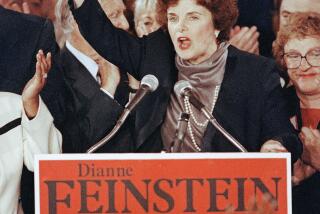Feinstein Vows Hiring Quotas by Race, Sex
- Share via
Democratic candidate for governor Dianne Feinstein delivered a sweeping and historic pledge Saturday to reserve half the jobs in her Administration for women and appoint minorities in direct measure to their percentage of the state’s population.
Campaigning before black audiences in Los Angeles, Feinstein said she would employ such numerical quotas through all levels of government, from her office staff to department heads to judges.
And she pledged to appoint a “minority entrepreneurship council” in the governor’s office “to set goals for the expansion of opportunity for minority entrepreneurs and minority-owned business” in purchasing and contracting by state government.
Feinstein, ahead in the polls and maintaining a light campaign schedule during the Memorial Day weekend, spoke Saturday to 75 black ministers in Hawthorne, then delivered a luncheon address in Los Angeles to 250 members of the National Council of Negro Women.
“Fairness is part of the dream; economic justice is part of the dream,” she told the luncheon meeting. “Affirmative action is part of the reality. But only through unity can we make the dream a reality and build a California that can make us all proud. . . . And that California must be one in which all people of color share.
“That is one of the reasons we have pledged an open and accessible administration. That is one of the reasons we have pledged to appoint women in proportion to their parity of the population--50%. To appoint people of color in proportion to their parity of the population. To see that the administration is open. To see that people of color are represented as judges on the high courts and the low courts, as department heads, on boards and commissions, on the governor’s staff--an example of openness, of fairness, of justice and of economic opportunity.
“This is the agenda, ladies and gentlemen, not a complicated agenda but an agenda long overdue,” she concluded.
In the past, Feinstein has spoken in broad terms about “gender balance” in her administration and “opportunity” and “fairness” for minorities. However, her plan for direct quotas based on population has not previously attracted wide attention.
According to estimates, California’s population last year was 62% white, 25% Latino, 7% black and 7% other minorities, including Asians. By 1994, the end of the next governor’s first term, projections show whites will fall to 58%, blacks to 6.6%, others including Asians will stay at 7% and Latinos will increase to 28%.
Feinstein planned a second day of campaigning for minority votes today with scheduled appearances at three black churches. The candidate, who is suffering from persistent cold-like symptoms, planned to take Memorial Day off.
Her weekend stops were the lastest of several campaign swings into minority, particularly black, communities. Throughout her career, Feinstein said proudly, “I have been primarily elected by people of color, because I believe in a level playing field . . . (and) in equal opportunity.”
Campaign aides said they expected Feinstein would dramatically outpoll opponent John K. Van de Kamp among black voters in the election nine days away.
Feinstein’s proposal of job quotas based on sex came despite criticism from Van de Kamp that during her two terms as mayor, women were unrepresented in senior City Hall positions. Van de Kamp has argued that he established a better record at appointing women to top campaign and government jobs. Feinstein brushed off such complaints, and her aides noted that of the five most important jobs she filled as mayor, she appointed two women and three minority men, an Asian, a black and a Latino.
In truth, both candidates have received measures of praise and criticism for the number of women and minorities they have appointed to high posts or invited into their inner political circles.
A Los Angeles Times Poll published Saturday showed Feinstein ahead of Van de Kamp by 11 points among likely Democratic voters. So she could hardly be faulted for the size of her smile and the confidence of her bearing. “The polls look good,” she said.
But like many candidates who are ahead in the final leg of a long campaign, Feinstein worried about her supporters dropping their guard and not turning out to vote. So, while there may be a separation of church and state, Feinstein recognized no such separation of church and politics this close to Election Day.
“I need you to help me turn out our voters. Nothing could be worse than our voters not voting on Election Day,” she told the ministers. “. . . I want to come together with you in a way no governor ever has in the history of this state. I will open my door to you anywhere, anytime, anyhow.”
Her reception was enthusiastic.
Rep. Mervyn Dymally (D-Los Angeles) said he had set several conditions on his endorsement for governor. He complained that white politicians too rarely venture into black neighborhoods.
“I said if you want me to support you, you have to meet with the black community, its ministers and publishers,” he said. He added: “She met those conditions, and was doing it before I asked.”
Bishop E. Lynn Brown of the Christian Methodist Episcopal Church of Los Angeles said he, too, wanted a governor who would be accessible to blacks. “When we call her up,” he said, “we don’t want to go through anyone.”
He also tried to put into words Feinstein’s ability to show empathy with the interests of a wide variety of voters, whether minorities, women, the elderly or even businessmen. “Somehow,” Brown said, “she instantaneously gets into your frame of reference.”
“Yes, yes,” the crowd chanted.
More to Read
Get the L.A. Times Politics newsletter
Deeply reported insights into legislation, politics and policy from Sacramento, Washington and beyond. In your inbox twice per week.
You may occasionally receive promotional content from the Los Angeles Times.










